Your Pregnancy at Week 28
Sciencephoto
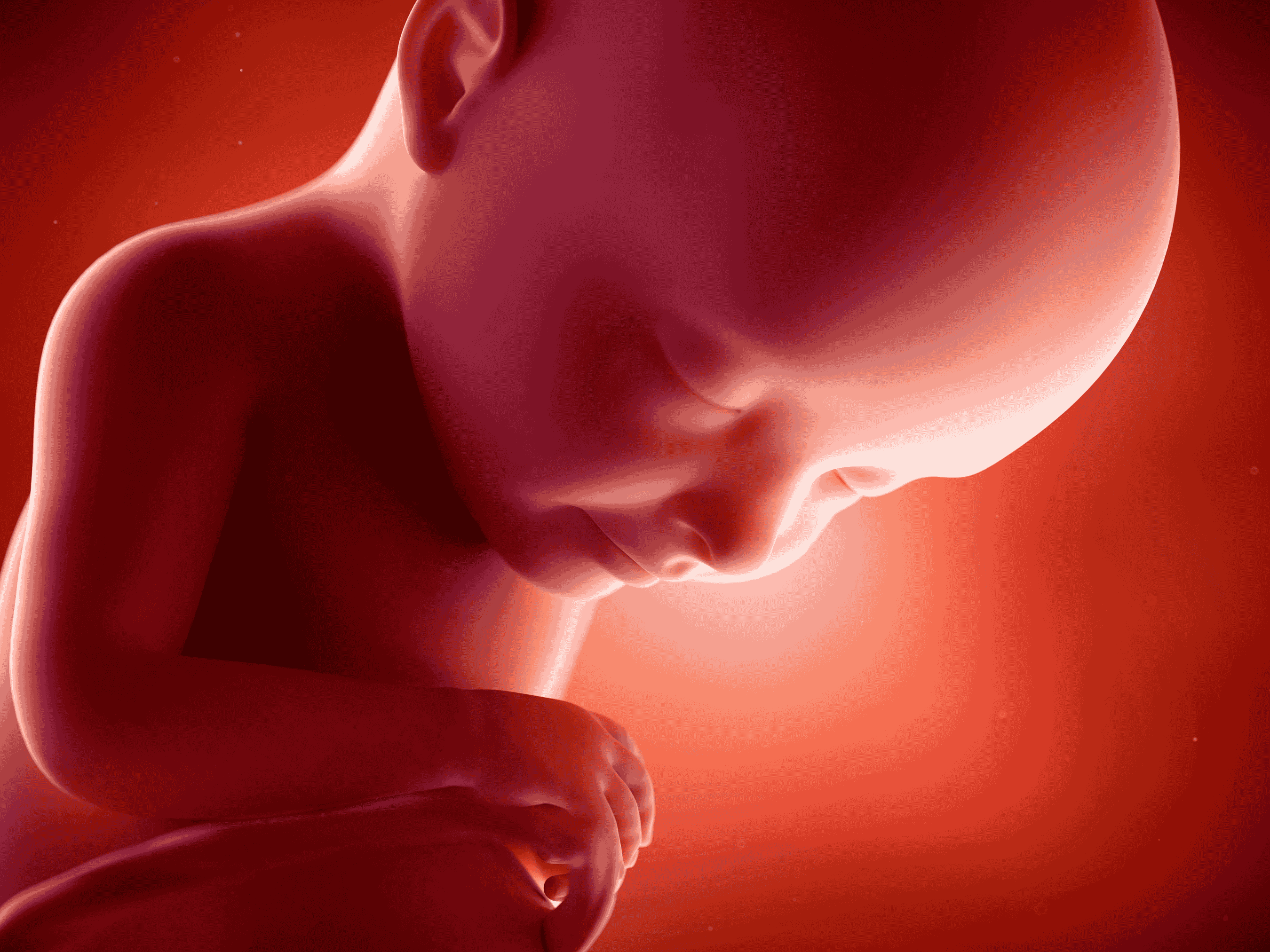
Written by Mindsmaking Medical Writer
Fact Checked by Mindsmaking Professionals
27th, July, 2025
In the blink of an eye, you've reached the third trimester of your pregnancy, just three months away from your due date! You might even meet your baby sooner or perhaps a week or two later.
In the blink of an eye, you've reached the third trimester of your pregnancy, just three months away from your due date! You might even meet your baby sooner or perhaps a week or two later. Your baby is slowly moving into the correct birth position (head-down) at this stage.
However, some babies may not have turned into this position yet and remain in the breech position. It's normal for babies to be in the breech position before 35 to 36 weeks of gestation, so if your baby hasn't moved into the head-down position yet, there's no need to worry. Your baby will typically turn head-down by the final weeks of pregnancy.
Key Takeaways
Your baby is beginning to look rounder due to the development of fat storage under the skin. This fat regulates the baby's body temperature and provides energy after birth.
Your baby measures around 14.80 inches and weighs about 1005 grams, comparable to an aubergine.
You may experience uncomfortable symptoms. The growing baby and pregnancy hormones can strain your digestive system, causing heartburn and indigestion, particularly when lying down.
This week, your uterus, which is about the size of a lime, moves from the bottom of your pelvis to the front and centre of your abdomen.
By 28 weeks pregnant, fatigue is common due to the physical strain of a growing bump and hormonal changes.
Any bleeding or spotting should be reported immediately as it could signal placental issues or preterm labour, though some spotting can be normal after sex or a cervical exam.
Drinking plenty of water is vital, whether you're pregnant or not. Hydration supports digestion, alleviates constipation, and helps manage frequent urination caused by pressure on the bladder from your growing baby.
Discuss and plan with your partner for labour, including strategies to stay connected and informed when the time comes.
Arrange who will drive to the hospital and care for other children. Discussing these plans with your partner or loved ones ensures everything is organised smoothly.
Take a peek
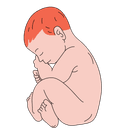
Hair Growth
The baby continues to grow hair. By now, eyebrows and eyelashes are visible, and the hair on the baby's head is getting longer.

Immune System Development
Your baby is absorbing antibodies from your blood, which will help strengthen their immune system and prepare them to fight diseases after birth.

Baby can blink
Up to this point, your baby's eyes have been tightly closed. With the fluttering eyelashes, your little cutie can open and close those lovely eyes.
Baby Development at Week 28
At this stage, your baby's brain is becoming more complex. Initially, the brain had a smooth surface, but now it's starting to form grooves and folds, known as gyri and sulci. This increase in surface area allows for more brain tissue and a higher capacity for brain functions.
Your baby continues to grow hair. Eyebrows and eyelashes are visible, and the hair on the baby's head is getting longer.
Your baby is beginning to look rounder due to the development of fat storage under the skin. This fat regulates the baby's body temperature and provides energy after birth. This process will continue for the rest of your pregnancy, ensuring your baby is healthy and ready for life outside the womb. (1)
Your baby's heart rate changes frequently. Around week 5 or 6, when the heartbeat is first detectable, it is about 110 beats per minute (bpm). By weeks 9 and 10, it increases to around 170 bpm. The rate has slowed to about 140 bpm and will be around 130 bpm at birth. This is much faster than your heart rate, typically around 80 to 85 bpm.
The rapid rate is due to the small size of the baby's heart, which compensates by beating faster to pump sufficient blood and to help keep them warm. Your baby's heartbeat can be heard with a stethoscope, and someone might even be able to hear it by placing an ear against your belly, although finding the right spot can be tricky. (5)
Their eyes are now blinking and can detect light filtering through the womb. Key organ systems such as the brain, lungs, and liver are nearly complete, and body fat has increased to about three percent. If your baby were born now, they would have a good chance of survival with medical support for breathing, feeding, and temperature regulation in a special care baby unit.
Tiny capillaries are forming inside the womb, giving your baby's skin a healthy pink hue. Your baby absorbs antibodies from your blood, strengthening their immune system and helping them fight diseases after birth.
Your baby might begin dreaming, blinking, and making facial expressions. This is an exciting period of development. (4)
Mindsmaking
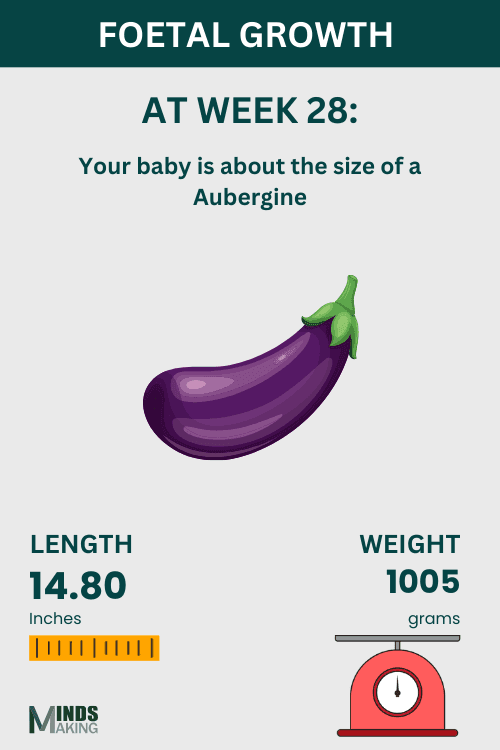
Body Changes at Week 28
By now, your baby has likely moved into position for delivery, with their head near the cervix. However, some babies might not shift until after week 30, and others may remain in a different position, such as breech. This positioning can cause additional pressure in the lower half of your body, especially on your bladder, leading to more frequent trips to the loo.
If you have a doctor's appointment this week, your healthcare provider will likely check your weight and blood pressure. They'll be on the lookout for signs of gestational diabetes and anaemia. These conditions, while common, need prompt treatment to ensure a safe pregnancy and a healthy baby. (4)
You'll see your doctor or midwife more often as you approach your due date. Starting this week, you might be asked to come for checkups every other week. Be sure to jot down any questions you have so you can discuss them at your next appointment.
As you have entered the third trimester, many of the symptoms you'll experience can be uncomfortable, and you may feel very tired. The growing baby and pregnancy hormones strain your digestive system, leading to heartburn and indigestion, especially when lying down at night.
Pregnancy also loosens your joints and ligaments, which can cause hip pain and backaches. If these issues arise, talk to your midwife for advice on relief. Additionally, water retention can cause puffy ankles, feet, and a more swollen face, particularly in hot weather. While swelling is a common pregnancy symptom, it's important to get checked by your healthcare provider as it can also be a sign of preeclampsia. This condition can be dangerous for you and your baby if not addressed.
Read This Next
No posts available
Baby Bump At Week 28
This week, your uterus, which is about the size of a lime, moves from the bottom of your pelvis to the front and centre of your abdomen. The fundal height, the distance from your pubic bone to the top of your uterus, should be around 26 to 30 centimetres. This measurement helps ensure that your baby's growth is on track and that they are in the correct position, as a breech or sideways position could affect the measurement.
If you are 28 weeks pregnant with twins, don't worry too much about your fundal height measurements, as it's more challenging for doctors to determine an "average" for twin pregnancies.
Pregnancy Symptoms at Week 28
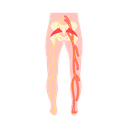
Sciatica
You may experience tingling or burning sensations in your legs. When your baby settles into the birth position, their head and growing uterus might press on the sciatic nerve in the lower part of your spine. This can cause severe pain or numbness starting in your buttocks and extending to the back of your legs, a condition known as sciatica. Sciatica can be very severe at times and may persist until delivery. To help relieve discomfort, you can use heating pads, take warm baths, do stretching exercises, or simply rest in bed.
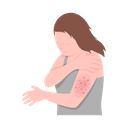
Chloasma
This week, you may start developing skin spots known as chloasma or pregnancy spots. These dark patches, called melasma, are primarily caused by hormonal changes during pregnancy. The increase in hormones, particularly oestrogen and progesterone, stimulates the production of melanin, the pigment responsible for skin colour, leading to these spots. Factors such as lack of rest and anxiety can also contribute to the appearance of melasma. The good news is that melasma typically fades within a few months after childbirth as your hormone levels return to normal.
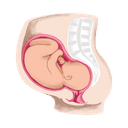
Itchy bump
Your baby is about the size of a pineapple, so your uterus has stretched significantly to accommodate their growth. This stretching also affects the skin on your bump. Although these changes may not always be visible, you might have felt them. As your bump has expanded, the skin on your abdomen may have become increasingly itchy. You may also notice stretch marks as the skin thins with stretching, resulting in reduced moisture and potential dryness or itchiness. Dealing with an itchy bump can be inconvenient and frustrating, but it's a common experience during pregnancy. If you have any concerns or questions about these symptoms or other aspects of your pregnancy, you must ask your doctor for guidance and reassurance. It's natural to track the growth of your bump and compare it with others, but remember, bumps come in various shapes and sizes. No one-size-fits-all definition of a "normal" or "typical" bump exists, and every pregnancy is unique.

Braxton-Hicks contractions
This practice contractions typically start in the third trimester and become more noticeable as delivery approaches. These contractions involve tightening the uterine muscles for about 30 to 60 seconds, occasionally lasting up to 2 minutes. While they can be uncomfortable, Braxton-Hicks contractions do not cause intense pain. They are irregular and do not follow a predictable pattern. In contrast, true labour contractions become progressively longer, stronger, and closer together over time. If you experience contractions that increase in duration and intensity or occur more frequently, it's important to seek immediate medical attention. These could be signs of active labour, and your healthcare provider should evaluate your condition to ensure you and your baby's well-being.

Fatigue
Fatigue is a common symptom during pregnancy; by the time you reach 28 weeks, you might have adjusted to having less energy. Your growing bump adds weight, making it challenging to find a comfortable sleeping position challenging. It's recommended to sleep on your sides during pregnancy, though this might take some getting used to if it's not your usual position. Using extra pillows for support can help you find a more comfortable arrangement. Aside from physical changes, emotional factors can also affect sleep during the third trimester. Since your first pregnancy test, you've been processing the impending arrival of your baby, which can bring about feelings of anxiety. It's normal to feel overwhelmed by such a significant life change. Stress is a common reason for difficulty sleeping, so it's important to lean on your loved ones and healthcare providers for support.
Pregnancy Concerns at Week 28
At 28 weeks pregnant, knowing when to seek medical attention is crucial. Severe swelling in your hands, feet, or face can indicate preeclampsia, a serious condition that also includes severe headaches, especially with vision changes or high blood pressure. Any vaginal bleeding or spotting during pregnancy should be reported to your doctor immediately. While some spotting can be normal, especially after sex or a cervical exam, it can also signal placental issues or preterm labour, both of which require prompt evaluation.
Persistent or severe abdominal pain that doesn't go away can be a sign of several conditions, including preeclampsia, placental abruption, or other complications. Any severe or continuous pain warrants an immediate medical assessment. A significant decrease in your baby's movements can be concerning. By 28 weeks, you should feel your baby move regularly throughout the day. If you notice a decrease in activity, try counting the kicks; if your baby moves less than ten times in two hours, contact your healthcare provider immediately.
Any change in vaginal discharge, particularly if it becomes watery, mucus-like, or has a foul smell, should be discussed with your healthcare provider. Watery discharge could indicate amniotic fluid leakage, while a foul smell might suggest an infection.
Health Tips for Week 28
Stay hydrated
Whether you're expecting a baby or not, maintaining good hydration by drinking plenty of water offers numerous benefits. During pregnancy, staying hydrated can aid digestion and help alleviate constipation. As your belly grows, you may need to urinate more frequently. This increased frequency is due to the added pressure on your bladder from your growing baby. Although pausing your favourite movie for a bathroom break can be frustrating, it's essential to keep drinking enough water and ensure you completely empty your bladder when urinating. Your kidneys filter waste from both your body and your baby, and this waste is eliminated in urine. Therefore, maintaining proper hydration and managing bathroom breaks effectively is crucial for your health and your baby's development during pregnancy.
Increase your DHA intake
As your baby's brain develops, supporting this growth with docosahexaenoic acid (DHA) is important. DHA is an omega-3 fatty acid crucial for brain development. You can ensure you get enough DHA through your diet, such as eating fatty fish or taking prenatal vitamins containing DHA. Experts recommend that pregnant or breastfeeding women consume 200 mg of DHA daily to support their baby's brain health.
Ease your discomfort
During this stage of pregnancy, it's common to experience various aches and pains as your body adjusts to the growing baby. While you might not be up for high-intensity workouts anymore, there are still plenty of ways to stay active and find relief. Gentle walks can help improve circulation and reduce swelling in your legs and feet. Prenatal yoga is excellent for maintaining flexibility, strengthening muscles, and promoting relaxation. Also, booking a prenatal massage can help relieve sore muscles and reduce stress. Remember to listen to your body and choose comfortable and soothing activities.
Avoid excessive sun exposure
Have you noticed spots on your face, a line forming down your lower belly, or skin tags on your upper arms? Before rushing to see a dermatologist, know that these unusual skin changes, such as darkened moles and heat rashes are common and temporary during pregnancy, mainly due to hormonal shifts. Sun exposure can exacerbate these changes. Protect your skin by staying shaded when possible and wearing a wide-brimmed hat outdoors. Apply a broad-spectrum sunscreen with SPF 30 or higher regularly. Sunscreen is safe and recommended during pregnancy, but if you have any concerns, it's wise to discuss them with your doctor.
Eat iron-rich foods
It's vital to ensure you're getting sufficient nutrients in your diet, particularly iron, which is crucial for producing haemoglobin in your baby and preventing anaemia, low birth weight, and premature delivery. Aim for a daily intake of 27 to 30 mg of iron during pregnancy as your blood volume expands to support your baby. Good sources of iron include lean red meat, pork, dried beans, spinach, dried fruits, wheat germ, oatmeal, and iron-fortified grains.
Advice for Partners
Now is an excellent time to cherish some quality moments with your pregnant partner before your baby arrives. Life will change with a baby, so make the most of these precious and quiet moments. Enjoy going on dates, watching movies together, taking short trips, and simply savouring each other's company.
It's important to be actively involved in decision-making and planning as the delivery of your child nears. Discuss your concerns about not being reachable when labour begins and devise strategies to avoid this. For instance, you might decide on a specific text message that signals she is going into labour. Additionally, talking with other parents who have faced similar issues can provide valuable insights and solutions that work for them.
Pregnancy Checklist for Week 28
- Choose a paediatrician now and inform them about your upcoming arrival. Your baby will need a checkup within a few days of birth, so it's crucial to arrange this before the baby arrives.
- With your baby's arrival fast approaching, it's wise to get things ready early, especially in case they come sooner than expected. Wash baby clothes, set the nursery, and stock up on postpartum recovery essentials.
- Start considering your baby's feeding plan now. Take a breastfeeding class if you plan to breastfeed. If not, use this time to research formula or breast pumps and discuss feeding schedules with your doctor.
- It's also an ideal time to discuss your birth options with your doctor. Will you be scheduled for an induction or a planned C-section? This will be important for your delivery and recovery plans. If you've had a previous caesarean, ask your doctor if you're eligible for a vaginal delivery if that's your preference.
- Begin planning your birth logistics: Determine who will drive to the hospital and who will care for any other children you have. Discuss these arrangements with your partner or loved ones to ensure everything is organised smoothly.
Frequently Asked Questions
How big is my baby at week 28?
Your baby is now about the size of an aubergine. Your baby now weighs about 1005g. When a snugly fit baby is measured from head to toe, its length is about 14.80 inches.
Is my baby's lungs fully developed at 28 weeks pregnant?
At 28 weeks, your baby's lungs are not yet fully developed but are making significant progress. At this stage, the lungs can produce surfactant, which helps keep the air sacs open, which is crucial for breathing after birth. While the lungs are still maturing and won't be fully developed until closer to the end of pregnancy, babies born at 28 weeks have a good chance of survival with medical assistance, particularly in a neonatal intensive care unit (NICU).
What should I avoid at 28 weeks pregnant?
During pregnancy, not only at 28 weeks, prioritise your and your baby's safety and health by avoiding risky activities like extreme sports or exercises that may cause falls. Steer clear of alcohol, nicotine, and recreational drugs, which can harm your developing baby. Limiting caffeine to 200 milligrams daily, roughly equivalent to a 12-ounce coffee, is advisable. Certain foods should be avoided, such as unpasteurised dairy, soft cheeses, raw or undercooked meat and fish, and eggs, as well as fish high in mercury. Whenever in doubt about dietary choices, beverage consumption, or suitable activities, consult your doctor for personalised advice.
Is it normal for my hands and feet to be swollen at 28 weeks pregnant?
Yes, it's normal to experience swelling in your hands and feet at 28 weeks pregnant. This swelling, known as oedema, occurs due to increased fluid retention and the pressure your growing uterus places on your veins. While mild swelling is common and usually harmless, it's essential to monitor it. If you notice sudden or severe swelling, especially in your face or around your eyes, or if it's accompanied by other symptoms like headaches or changes in vision, contact your healthcare provider, as these could be signs of preeclampsia.
How should I be feeling at 28 weeks pregnant?
As you have entered the third trimester, many of the symptoms you'll experience can be uncomfortable, and you may feel very tired. The growing baby and pregnancy hormones strain your digestive system, leading to heartburn and indigestion, especially when lying down at night. Pregnancy also loosens your joints and ligaments, which can cause hip pain and backaches. If these issues arise, talk to your midwife for advice on relief.
Was this article helpful?
How many stars are you giving this article?
Leave a comment
Your email address will not be published.










































